- Home
- Michael Grant
Lies Page 26
Lies Read online
Page 26
She stood up. Faced the town. She would go there. She knew the demon would go there too.
Mary worked on the next week’s schedule in her cramped little office. John stood in the doorway.
In the plaza they were starting to cook food. Mary smelled it, even through the omnipresent stink of pee and poop and finger paint and paste and filth.
Charred, crisping meat. She would need to gag some of it down and do it publicly. Or everyone would look at her and point and whisper “anorexic.”
Crazy. Unstable.
Mary’s losing it.
No longer Mother Mary. Crazy Mary. Off-her-meds Mary. Or on-too-many-meds Mary. Everyone knew now, thanks to Astrid. They all knew. They all could picture it in their heads, Mary searching for Prozac and Zoloft like Gollum chasing the ring. Mary sticking her finger down her throat to vomit up food even while normal people were reduced to eating bugs.
And now they thought she’d been tricked by some fraud. Made a fool of by Orsay.
They thought she was suicidal. Or worse.
“Mary,” John said. “Are you ready?”
He was so sweet, her little brother. Her lying little brother, so sweet and so concerned. Of course he was. He didn’t want to get stuck taking care of all these kids alone.
“That food smells good, huh?” John asked.
It smelled like rancid grease. It smelled sickening.
“Yes,” Mary said.
“Mary.”
“What?” Mary snapped. “What do you want from me?”
“I’m…Look, I’m sorry I lied. About Orsay.”
“The Prophetess, you mean.”
“I don’t think she’s a prophet,” John said, head hung down.
“Why, because she doesn’t agree with Astrid? Because she doesn’t think we just have to be trapped here?”
John moved closer. He put his hand on Mary’s arm. She shook him off.
“You promised me, Mary,” John pleaded.
“And you lied to me,” Mary shot back.
There were tears in her brother’s eyes. “Your birthday, Mary. In an hour. You shouldn’t be wasting time on the schedule, you should be getting ready. You have to promise me you won’t leave me or these kids.”
“I already promised you,” Mary said. “Are you calling me a liar?”
“Mary…,” John pleaded, having run out of words.
“Get the kids ready to go outside,” Mary said. “There’s food being cooked. We have to get our share for the littles.”
THIRTY-SIX
47 MINUTES
WORD HAD GONE out about the cookout. But it wasn’t really necessary. The smell of food cooking was all that was necessary. Albert had arranged it all with his usual efficiency.
Astrid sat on the town hall steps. Little Pete sat a few steps behind her, playing his dead game like he was playing for his life.
Astrid swallowed, nervous. She smoothed the two sheets of paper in her hands. She kept crumpling them unconsciously and then, realizing what she had done, straightening them out. She pulled a pen out of her back pocket, scratched out some words, rewrote them, scratched them out, and started the whole crumple and uncrumple pattern again.
Albert was nearby, watching the whole place, arms folded over his chest. He was, as usual, the neatest, cleanest, calmest, most focused person there. Astrid envied that about Albert: he set a goal and never seemed to suffer any doubt about it. Astrid was almost, but not quite, resentful of the way he had come to her and ordered her to quit feeling sorry for herself and get her act together.
But it had worked. She’d finally done what she needed to do. She hoped. She hadn’t shown the results to anyone yet. People might just decide she was crazy. But she hoped not, because even after all the self-doubt, after all the abuse she’d endured, she still thought she was right. The FAYZ couldn’t just be Albert making money and Sam kicking butts. The FAYZ needed rules and laws and rights.
People were coming, drawn by the smell of meat. Not a lot of it per person, Albert had made that clear, but in the aftermath of the fire, with many kids having lost their limited stocks of food, and with nothing coming in from the fields, the prospect of any food at all made stomachs rumble and mouths water.
Albert had guards ready, four of his own people armed with baseball bats, the default weapon of the FAYZ. And two of Edilio’s guys, and Edilio himself, walked with guns slung over their shoulders.
The strange thing was how it no longer seemed strange to Astrid. A nine year-old dressed in rags, sharing a bottle of Scotch with an eleven-year-old with a shaved head and a cape made out of an olive green bed sheet. Kids with sunken eyes. Kids with open sores, untreated, barely noticed. Boys wearing nothing but boxer shorts and boots. Girls wearing their mother’s glittery formal gowns, shortened with rough scissor hacks. A girl who had tried to remove her own braces with pliers and now couldn’t close her mouth because of the jagged wire sticking through her front teeth.
And the weapons. Everywhere weapons. Knives, ranging from big chef’s knives stuck in belts, to hunting knives in ornate leather sheaths. Crowbars. Pieces of pipe with taped handles and lanyards. Some had been even more creative. Astrid saw a seven-year-old carrying a wooden table leg to which he had glued big slivers of broken glass.
And it had all become normal.
In this plaza coyotes had attacked screaming, defenseless children. That had changed a lot of people’s attitudes toward weapons.
But at the same time, girls carried dolls. Boys crammed action figures into their back pockets. Stained, torn, ratty comic books still stuck out of waistbands or were clutched in hands with nails as long and filthy as a wolf’s. Kids pushed baby strollers loaded with their few possessions.
The kids of Perdido Beach were a mess at the best of times. But it was so much worse now in the aftermath of the fire. Kids were still black with soot or gray with ash.
Coughing was the background noise. The flu that had been going around was sure to spread through this crowd, Astrid thought grimly. Lungs damaged by smoke inhalation would be especially vulnerable.
But they were still alive, Astrid told herself. Against all the odds, more than ninety percent of the kids first trapped in the FAYZ were still alive.
Mary led the preschoolers out of the day care into the plaza. Astrid looked closely. Mary seemed her normal self. She grabbed a little girl who was about to step in front of a boy on a skateboard.
Had she been wrong about Mary? Mary would never forgive her.
“Well, so what?” Astrid muttered wearily. “It’s not like I was ever popular.”
Then, Zil and a half dozen of his crew swaggered into the plaza from the far side. Astrid clenched her jaw. Would the crowd turn on them? She almost hoped so. People thought because she wouldn’t let Sam go after Zil she must not really despise the Human Crew’s Leader. That was wrong. She hated Zil. Hated everything he had done and everything he had tried to do.
Edilio moved quickly between Zil and a few of the boys who had started toward him, sticks and knives at the ready.
Zil’s kids were armed with knives and bats, and so were those who wanted to take them on. Edilio was armed with an assault rifle.
Astrid hated that this was what life so often came down to: my weapon is bigger than your weapon.
If Sam were here it would be about his hands. Everyone had either seen what Sam could do, or heard the stories retold in vivid detail. No one challenged Sam.
“It’s what makes him dangerous,” Astrid muttered to herself.
But it was also what had kept her alive on more than one occasion. Her and Little Pete.
She hated Sam for doing this, for just withdrawing like this. Disappearing. It was passive aggressive. Unworthy of him.
But another part was glad he was gone. If he were here it would be all about him. If Sam were here then every word Astrid spoke would be conditioned on what Sam would say or do. The kids would be watching his face for clues, waiting to see whether he nodded or laughe
d or smirked or gave them that cool, steely warning look he’d acquired over these last months.
Orc made his way into the crowd. People parted to let him pass. Astrid spotted Dekka, as always left alone by other kids so that she seemed to have a force field around her. The one person Astrid didn’t see was Brianna. Brianna wasn’t someone you missed or overlooked. She must still be too sick to go out.
“It’s time,” Albert said over his shoulder.
“Now?” Astrid was surprised.
“Once we feed them they’ll go off in separate directions. I got them here and behaving themselves because of food. Once the food is gone…”
“Okay.” Astrid’s heart was in her throat. She clenched her papers again and stood up too suddenly.
“Like Moses, huh?” Albert said.
“What?”
“Like Moses coming down off the mountain with the Ten Commandments,” Albert said.
“Those were written by God,” Astrid said. “This wasn’t.”
She tripped a little walking down the steps but caught herself. No one was paying particular attention as she entered the crowd. One or two kids called out greetings. Many more made rude or hostile remarks. Mostly kids were focused on the small fires, where venison and chunks of fish browned on skewers made of wire clothes hangers.
She reached the fountain, which was close enough to the cook fires that kids noticed when she climbed up and unfolded her papers.
“Everyone…,” she began.
“Oh, puh-leeze, not some speech,” a voice heckled.
“I…I just have a few things to say. Before you can eat,” Astrid said.
A groan went up. One kid picked up a piece of dirt and tossed it with poor aim—and not too much commitment—at Astrid. Orc took two steps, brushing aside a couple of kids in the process, and made a low growling noise with his scary face right up against the kid’s nose. That signaled the end of dirt throwing.
“Go ahead, Astrid,” Orc rumbled.
Astrid noticed Edilio hiding a smile. Back a million years ago, back in the old life, Astrid had tutored Orc.
“Okay,” Astrid began. She took a deep breath, trying to calm herself down. “I…Okay. When the FAYZ came, all our lives changed. And ever since then all we’ve tried to do is get by, day to day. We’ve been lucky because some people worked very hard and took big risks to help us all make it.”
“Can we eat now?” a younger kid cried.
“And we’ve all been focused on getting by and focused on what we’ve lost. Now it’s time to start working on the future. Because we’re going to be here for a while. Maybe for the rest of our lives.”
That drew some very harsh words, but Astrid kept going.
“We need rules and laws and rights and all,” Astrid said. “Because we need to have some justice and some peace.”
“I just want food,” a voice cried.
Astrid plowed ahead. “So, you’ll all get to vote on this. But I’ve written down a list of laws. I kept it simple.”
“Yeah, because we’re too stupid,” Howard said, suddenly just in front of her.
“No, Howard. If anyone was stupid, I was. I kept looking for some perfect system, something that wouldn’t involve compromising anything.”
That got the attention of a few more kids.
“Well, there is no perfect system. So I wrote down an imperfect set of laws.”
“Rule number one: Each of us has the right to be free and to do whatever we want as long as nothing we do hurts anyone else.”
She waited. No heckling. Not even from Howard.
“Two: No one can hurt another person except in self-defense.”
Grudging attention was being paid. Not everyone. But some, and more as she continued.
“Three. No one can take another person’s possessions.”
“Not that we have anything much to take,” Howard said, but was shushed.
“Four. We’re all equal and have exactly the same rights. Freak or normal.”
Astrid saw the glint of anger on Zil’s face. He was looking around himself, seeming to take the temperature of the crowd. She wondered if he would make a move now or wait for another opportunity.
“Five. Anyone who commits a crime—stealing or hurting someone—will be accused and then tried by a jury of six kids.”
Some of the crowd were losing interest again and beginning to cast sidelong glances at the food. But others waited patiently. Even respectfully.
“Six: lying to the jury is a crime. Seven: penalties can be anything from a fine to getting locked up in a jail for a period of a month or more, to permanent exile from Perdido Beach.”
The crowd mostly liked this. There was some clowning around, kids pointing at each other, some shoving, mostly good-natured.
“Eight. We’ll elect a new town council every six months. But the council cannot change these first nine rules.”
“Are we done, yet?” Howard asked.
“One more. The ninth rule,” Astrid said. “And this is the one I have the most doubt about. I kind of hate the idea of this rule. But I can’t see any way around it.” She glanced at Albert and then nodded at Quinn, who frowned and looked confused.
This, finally, got everyone’s attention.
Astrid folded the paper and stuffed it into her pocket. “Everyone has to live by these laws. Normal or freak. Regular citizen or member of the council. Except…”
“Except Sammy?” Howard supplied.
“No!” Astrid snapped. Then, more calmly, refusing to be provoked, “No, not except Sam. Except in the event of an emergency. The council will have the right to suspend all other rules for a period of twenty-four hours if there’s a major emergency. In that case the council can appoint a person, or several people, to act as Town Defenders.”
“Sammy,” Howard said. He laughed cynically.
Astrid ignored him and instead focused on Zil. “And if you think that’s directed at you, Zil, you’re welcome to think so.”
In a louder voice Astrid cried, “You’ll all get a chance to vote, but for now, temporarily, these rules will be the law as soon as a majority on the council says so.”
“I vote yes,” Albert said quickly.
“Me, too,” Edilio called out from somewhere in the crowd.
Howard rolled his eyes. He looked at Orc, who nodded his head yes. Howard sighed theatrically. “Yeah, whatever.”
“Okay, then,” Astrid said. “With my vote that’s four out of seven. So. These are the laws of Perdido Beach. The laws of the FAYZ.”
“Can we eat now?” Howard asked.
“One last thing,” Astrid said. “I lied to people. And I got other people to lie. That’s not against any of these rules, but it’s still wrong. The result is that kids won’t really trust me in the future. So I’m quitting the town council. Effective right now.”
Howard began an ironic slow clapping. Astrid laughed. It didn’t even bother her. In fact, she felt like joining in herself. Like she could finally stand outside herself, see herself as shrill and controlling and faintly ridiculous.
Strangely, it made her feel better.
“Now, let’s eat,” Astrid said. She hopped down from the fountain and actually felt lighter when she landed. Like she’d weighed five hundred pounds a minute ago and was now as light and nimble as a gymnast. She patted Howard on the shoulder and went to Albert, who was shaking his head slowly.
“Nice,” Albert said. “You get to quit.”
“Yep. So now I guess I need a job, Albert,” Astrid said. “You have any openings?”
THIRTY-SEVEN
33 MINUTES
“I DIDN’T WET my bed or anything,” Justin said. “At my house I mean.”
Mary ignored him. Instead she watched Astrid’s performance. It made her bitter. Of course Astrid had found a way out of the hole she’d dug for herself. Smart, beautiful Astrid. It must be great to be Astrid. It must be great to have so much confidence that you could just stand up there handing out a set of
rules and then blithely walk away, with your pretty blond head held high.
“Can I go see Roger after we eat?”
“Whatever,” Mary said. She’d be out of it all soon. Done with this awful place and these awful people. She’d sit outside with her mother and tell her stories about it.
Astrid was lining up now for barbecue. Astrid and Little Pete together. Kids were clapping her on the back. Grinning at her. Liking her more than they had in the past. Why? Because she had admitted she had screwed up and then she’d quit and left them with a new set of rules to follow.
In her own way Astrid had taken the poof, Mary thought.
How many minutes left until Mary had her own chance at escape? She pulled Francis’s watch from her pocket. Half an hour.
After all the worry and anticipation it still seemed to rush up at her, the time.
John was looking at her now, even as he herded the kids toward the front of the food line. Looking at her. Expecting something from her. Just like everyone else.
Mary should go stand in the food line herself, of course, show Astrid up as a liar for calling her anorexic.
But really, what did Mary have to prove to anyone?
She ignored John’s wave, ignored kids around her, and headed back into the day care.
It was quiet and empty.
This place had been her whole life since the FAYZ. Her whole life. This messy, stinking, gloomy hole. She stared at it. Hated it. Hated herself for letting this define her.
She didn’t hear anyone behind her. But she felt it.
The back of her neck tingled.
Mary turned. There. Behind the milky translucent plastic that covered the jagged hole between the day care and the hardware. A shape. A form.
Mary’s mouth was dry. Her heart pounded.
“Where are they, Mary?” Drake asked. “Where are the snot-nosed little monsters?”
“No,” Mary whispered.
Drake looked at the edges of the cinderblock with detached interest. “This was clever, the way Sam did this. Burned right through the wall. I didn’t see it coming.”

 Fear
Fear Plague
Plague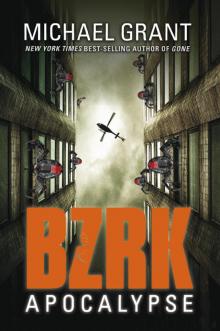 BZRK: Apocalypse
BZRK: Apocalypse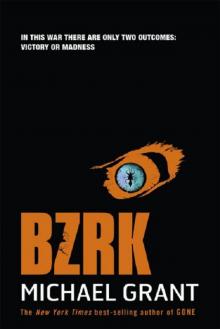 Bzrk
Bzrk Love Sucks and Then You Die
Love Sucks and Then You Die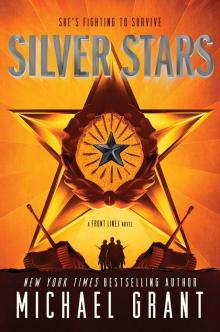 Silver Stars
Silver Stars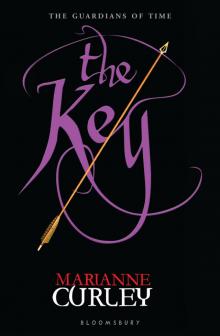 The Key
The Key Front Lines
Front Lines BZRK Origins
BZRK Origins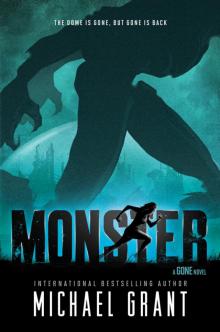 Monster
Monster Gone
Gone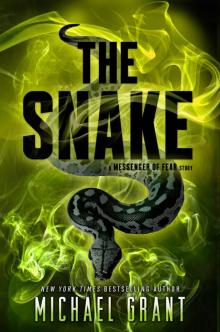 The Snake
The Snake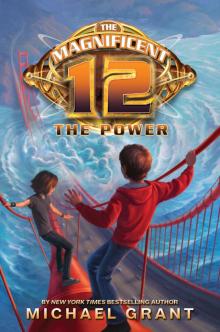 The Power
The Power Hunger
Hunger Lies
Lies A Sudden Death in Cyprus
A Sudden Death in Cyprus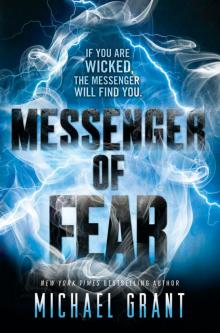 Messenger of Fear
Messenger of Fear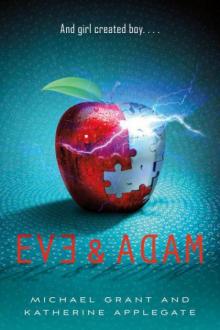 Eve & Adam
Eve & Adam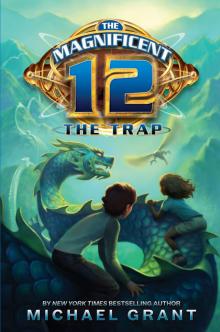 The Trap
The Trap Light
Light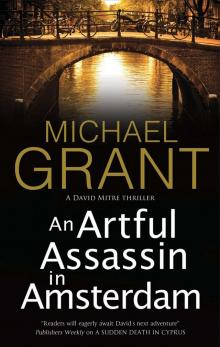 An Artful Assassin in Amsterdam
An Artful Assassin in Amsterdam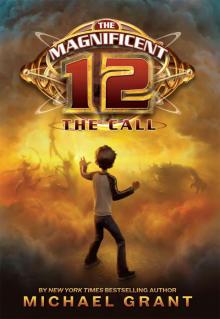 The Call
The Call Hero
Hero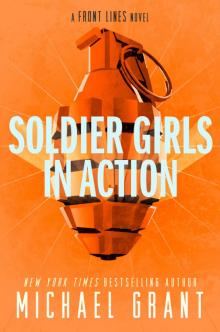 Soldier Girls in Action
Soldier Girls in Action Purple Hearts
Purple Hearts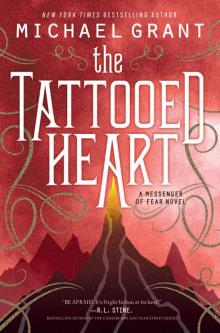 The Tattooed Heart
The Tattooed Heart The Fall of the Roman Empire
The Fall of the Roman Empire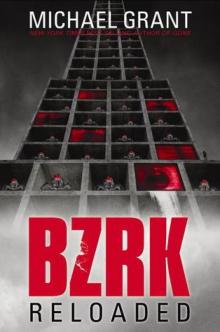 BZRK Reloaded
BZRK Reloaded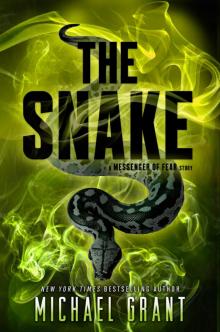 Messenger of Fear Novella #1
Messenger of Fear Novella #1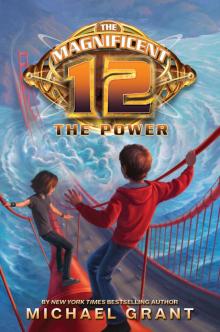 The Magnificent 12
The Magnificent 12 Fear: A Gone Novel
Fear: A Gone Novel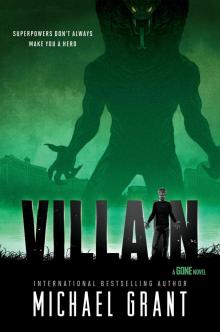 Villain
Villain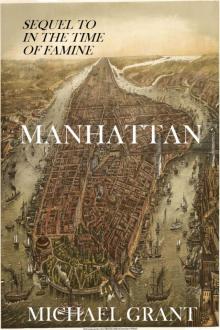 Manhattan
Manhattan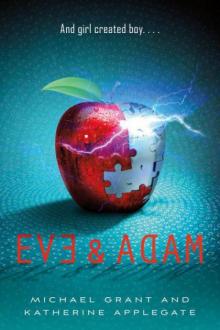 Eve and Adam
Eve and Adam Plague: A Gone Novel
Plague: A Gone Novel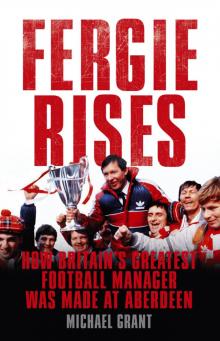 Fergie Rises
Fergie Rises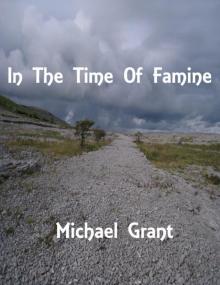 In the Time of Famine
In the Time of Famine Hunger_A Gone Novel
Hunger_A Gone Novel Lies g-3
Lies g-3